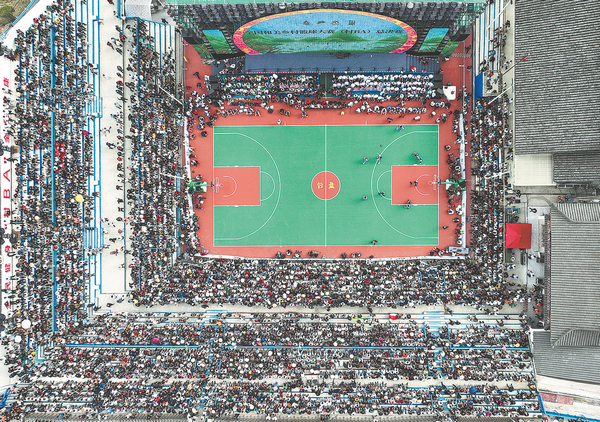

GUIYANG — The finals of the Village Basketball Competition of China, also known as CunBA, was held recently in Taipan village in Taijiang county, Guizhou province.
Not far from the court, dozens of stalls were selling handicrafts to the many basketball fans and tourists who came to watch the finals.
Shi Chuanying, 45, an inheritor of Miao embroidery from Shidong town, Taijiang county, was at the market with her family to sell her embroidery and basketball-related handicrafts.
One large and colorful framed piece, vividly depicting a grand scene from the CunBA competition, attracted much admiration.
"The CunBA has brought us economic benefits. Whether it's coaches, athletes or tourists, as long as they come to watch the games, they buy our handmade products. For CunBA, we also specially designed an embroidered plant-dyed cotton T-shirt, which is very popular," says Shi.
In order to offer more products, Shi returned to her store and prepared for sales. She opened the store, which sells a lot of Miao silver jewelry and embroidery work, 10 years ago.
"In the past, Taijiang county only got a lot of tourists when we held important festivals. The rest of the time, there were only a few. Right now, visitors to the CunBA events will also do some shopping, buying embroidery, batik and other cultural and creative products," says Shi, adding that during the games, she sold 70,000 yuan ($9,500) worth of items.
"In the future, I want to develop more basketball-related cultural and creative products, so that Miao culture gets more exposure, and with the help of the CunBA brand, I will promote our ethnic culture," says Shi.
The event has made Taipan village famous, attracting thousands of basketball fans. It has also benefited residents and has become a driving force in the development of nearby towns.
In neighboring Rongjiang county, the local government has integrated intangible cultural heritage to help develop the regional economy via the process of indigo dyeing.
As the "Hometown of China's indigo dyeing culture", Rongjiang has been planting isatis root since ancient times, and local ethnic groups use it to make traditional medicine and to dye clothes.
"For the Village Super League, we developed 40 cultural and creative products, and many people have come to us for further cooperation," says Luo Yun, head of a local company's cultural and creative section.
"At present, online orders for intangible cultural and creative products have surpassed production capacity, and we also have many new offline orders. During the Village Super League period, we sold more than 450,000 yuan of cultural and creative products," Luo adds.
"The process of mechanizing indigo dyeing techniques has both local cultural attributes and market potential, which can be extended into a mature industrial chain, and market prospects are broad," says Yu Hao, chairman of Guizhou Indigo Agricultural Investment.
"Thanks to new media and network communication, the influence of the Village Super League event has been expanded, and live e-commerce has also provided more possibilities for the promotion and sale of Guizhou's intangible cultural heritage," Yu adds.
Xinhua